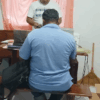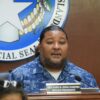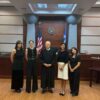MAJURO — Attorneys for the Marshall Islands government and American tobacco industry made their pitch Wednesday morning here to a Supreme Court panel of three American judges whose ruling in the coming months will decide whether this controversial, potentially multi-billion dollar case has a future.
Marshall Islands attorney Suzelle Smith told the judges that “this is an issue of a truly historic nature” that ranks in importance with a handful of landmark cases decided by the U.S. Supreme Court during the last century. While tobacco industry attorney Gregory Stone told the court that U.S. appeals courts have thrown out similar damage claims filed by other countries as well as state governments, Smith countered that “this is a case of first impression. There is nothing in the decisions cited by Tobacco to compel you to rule either way.”
The Marshall Islands government wants the Supreme Court to reverse a High Court dismissal of its suit against the American tobacco industry. The High Court ruled in favor of the tobacco industry late last year saying the Marshall Islands failed to demonstrate evidence of damage from tobacco use in this central Pacific nation.
If the Supreme Court rules for the Marshall Islands by reversing the High Court ruling on the evidence issue, the tobacco attorneys say that it should still dismiss the case on the basis that numerous U.S. court rulings have already dismissed similar claims by governments on the basis that the governments’ claims are too remote and indirect to have legal standing. The tobacco lawyers had filed a motion to dismiss on these grounds that was rejected by the High Court.
Supreme Court Chief Justice Allen Fields was joined by temporary judges Alfred T. Goodwin of the U.S. 9th Circuit Court of Appeals and Barry Kurren of the Hawaii Federal District Court.
Marshall Islands attorney Donald Howorth said High Court Judge H. Dee Johnson erred when he dismissed the case for lack of evidence based on his rejection of an analysis presented by the chief Marshall Islands expert witness, Dr. Robert Miller. Miller used a U.S. standard for calculating damages in the Marshall Islands that the High Court rejected as inappropriate for the Marshall Islands. Howorth said there was much evidence of tobacco damage even without reference to Miler’s testimony.
He cited a late 1980s national health plan that indicated that more than 25 percent of government health expenditures were for tobacco-related diseases.
Tobacco company attorneys criticized this data as not identifying what fraction of illnesses such as heart disease are caused by tobacco use.
The fact that a Marshall Islands survey showed that there was no difference in health care spending between smokers and non-smokers didn’t mean there is no damage from tobacco, Howorth said.
In the Marshall Islands, the government is obligated to provide health care to all citizens. If it spends $100 on smokers and non-smokers alike for health services and doesn’t have any money left over to fund additional services for illnesses related to smoking, this doesn’t mean there is no damage as the tobacco industry claims, he said.
Howorth also said that it was unfair that the evidence by the government’s primary expert witness was denied and an appeal for use of a different formulation was also denied.
He said the case would stand on the testimony of Palafox and local businessman Jerry Kramer, but he would prefer to have Miler’s testimony accepted. “There is no basis not to allow us to bring in another expert witness,” he said.
Howorth also pressed the Marshall Islands’ contention that if the case is sent back to the High Court for trial, Judge Johnson should be removed for comments he made in an interview with Radio New Zealand last year while the case was still pending that Howorth said “pre-judged” the outcome of the case, and gave the appearance of impropriety.
In his counter argument, tobacco company attorney John Phillips said the Marshall Islands had simply failed to prove any damages. Both mortality and morbidity approaches to damages were not used by the Marshall Islands because there was no data available, Phillips said.
So they used Miler’s “utilization” approach to damages. But a survey conducted by the Marshall Islands shows that smokers don’t use the hospital more than non-smokers, he said.










